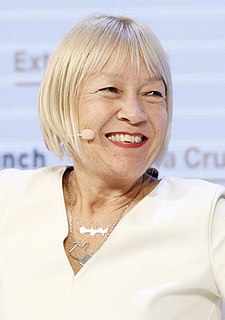Top 383 Startup Quotes & Sayings - Page 7
Explore popular Startup quotes.
Last updated on April 15, 2025.
The primary thing that any technology startup must do is build a product that's at least 10 times better at doing something than the current prevailing way of doing that thing. Two or three times better will not be good enough to get people to switch to the new thing fast enough or in large enough volume to matter.
Nearly half the earth's surface is unclaimed by any country, so seasteads would be startup countries on the blue frontier. Patri Friedman is a Google engineer and theorist of political economy who realized that if society floated, it would completely change the nature of governance itself. If seasteads are modular and can be moved about, allowing people to choose new societies, we'd create a market of governance providers, competing to attract residents.
A sure sign of failure for a startup is when someone sends me logo-embroidered polo shirts. If your people are at shows and in public, it's okay to buy for your own employees, but if you really think people are going to wear your branded polo when they're out and about, you are mistaken and have no idea how to spend your money.
I think because of the iPhone and the fact that we now have a ubiquitous internet, our creativity in the startup space is 10 times different. Every single industry, every single market, is going to be technology-driven in some way. There's an infinite opportunity for startups because now you can go and solve problems that previously looked like they had nothing to do with technology.
Generally speaking, experience counts for something. So you'd expect entrepreneurs who've been through the ups and downs of a tech startup to have an advantage over the newcomers. Or at least have an equal chance at success. But in fact the opposite may be true. A number of venture capitalists I've spoken with have said that too many "old guard" entrepreneurs are not being bold enough in their business decisions, and it's hurting their startups.
Google is a place filled with open-minded, innovative people from all over the world. It's a fun place to work, and it's a place where different kinds of skills come together. As we grew from a startup, I remember our founders saying that people don't want us to change our culture, but we need to keep making it better. It's an attitude: "We are the ones we've been waiting for." Silicon Valley in general, tech in general, means using technology to solve big problems in the world.
Science and vision are not opposites or even at odds. They need each other. I sometimes hear other startup folks say something along the lines of: 'If entrepreneurship was a science, then anyone could do it.' I'd like to point out that even science is a science, and still very few people can do it, let alone do it well.
When we launched If WeRanTheWorld, I said to my team, I want us to innovate in every aspect of how we design and operate this as a business venture, as much as the web platform itself - because I want us to design our own startup around the working lives that we would all like to live. Women and men alike.
Define your own success: If you're going after a million bucks with your own startup, you've already failed yourself. Instead, do something because it's interesting, challenging, it offers you the chance to learn something new or gives you the chance to work with really interesting people. Most startups that are designed to make money, especially in this environment, don't.
You can fake a lot in a startup these days, what with Amazon Web Services and all sorts of off-the-shelf back-end components that let any even minimally competent duffer set up a Web app that does something. Intelligent planning for growth is rare among early startups, but it's the name of the game at a large, rapidly scaling tech company.
Every entrepreneur faces trade-offs when founding and growing their company. As we discovered at YouTube, those early decisions have far-reaching impacts and lead to unforeseen pitfalls down the road. Noam Wasserman uses vivid anecdotes and deep research to expertly outline the key early choices that define a startup, making The Founder's Dilemmas an invaluable alternative to real-world trial and error.
EU tech companies face massive global competitors from Silicon Valley and China. Our goal should be to create real European champions and not to focus on a narrow competition between European states. I strongly believe the European Union can help a lot there by promoting a homogeneous and startup-friendly framework that could help European digital champions to become truly global.
State funds, private equity, venture capital, and institutional lending all have their role in the lifecycle of a high tech startup, but angel capital is crucial for first-time entrepreneurs. Angel investors provide more than just cash; they bring years of expertise as both founders of businesses and as seasoned investors.
The problem with the Internet startup craze isn't that too many people are starting companies; it's that too many people aren't sticking with it. That's somewhat understandable, because there are many moments that are filled with despair and agony, when you have to fire people and cancel things and deal with very difficult situations. That's when you find out who you are and what your values are.
Some incubators, like Y Combinator and TechStars, were started by successful entrepreneurs wishing to help the next generation learn from their experiences. Other programs, such as Viterbi Startup Garage and Austin Technology Incubator, were created by universities to help young entrepreneurs bridge the knowledge gap from student to funded company.
If you have a strong business idea, then it is comparatively easy now to get capital. It is a positive thing that increasingly more people want to join the startup bandwagon. However, to build a successful business, focus on creating more value through the product, and direct your efforts on solving real issues. If you manage to build a sustainable product, revenue will follow. A lot of startups fail because they concentrate on incremental innovations, increasing user base, and monetisation before strengthening the core of their business.
Evolving our culture to operate and think differently is no small task. We are challenging our employees to be the best of both small and big companies - they should operate with the soul and spirit of a startup, while leveraging the scale, resources and capabilities of Campbell - with the goal of ultimately becoming the biggest small company.
Let's say a startup is hot. It ships something great, and it achieves success. Thus, it's able to attract the best, brightest, and most talented. These people have been told they're the best since childhood. Indeed, being hired by the hot company is "proof" that they are the A and A+ players; in fact, the company is so hot that it can out-recruit Google and Microsoft.
As a small business or startup, one of the factors you should always consider when looking at a potential partnership is the incremental potential reach. Note that wider reach doesn't always mean a better partnership opportunity. Instead of sheer scale, take a look at which communities your potential partner can open up for you.
I was amazed at how the life of a freelancer differed from running a remote studio for another company. I thought I knew what I was doing in 2004 when I left Eidos because I had run Ion Storm Austin, which was my own independent studio. I had run a business unit inside Origin, but being part of a startup is crazy.
YouTube began as a failed video-dating site. Twitter was a failed music service. In each case, the founders continued to try new concepts when their big ideas failed. They often worked around the clock to try to overcome their failure before all their capital was spent. Speed to fail gives a startup more runway to pivot and ultimately succeed.




















